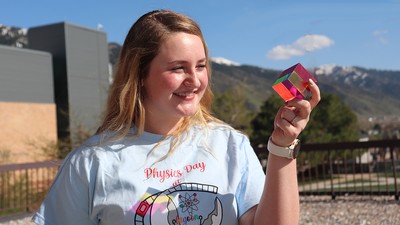USUSA President Sami Ahmed Talks Carbon Dividends, Looks at Legacy Left Behind
By Marcus Jensen |
Video by Taylor Emerson, Digital Journalist, University Marketing and Communications.
In what will be one of his final acts as president of the Utah State University Student Association, Sami Ahmed added his name to nine other student body presidents from across the state of Utah to a petition to affect climate change in the United States. Ahmed and his colleagues wrote a letter addressed to the Utah congressional delegation that endorsed a plan for the country to consider adopting carbon dividends.
“It's the idea that there are externalities involved with actions and these big companies or groups that pollute pay society back in a form of a carbon dividends for whatever type of carbon footprint they have,” Ahmed said. “The idea is when you're paying something, you start to be more aware of processes that might have non-friendly outcomes to the environment, and you start looking to be more efficient.”
The carbon dividends plan was originally introduced in 2017 by several authors for the Climate Leadership Council (CLC). The plan works to improve air quality by gradually increasing taxes on CO2 emissions. In step two of the plan, “all the proceeds from this carbon tax would be returned to the American people on an equal and monthly basis via dividend checks.” The plan would also charge fees to countries who do not have their own carbon pricing plans and would eliminate regulations that are “no longer necessary” should the carbon dividend plan take effect and provide “significant regulatory simplification.” The plan promises to strengthen the economy, cut carbon emissions and the country’s reliance on fossil fuels, all while encouraging technological innovation.
Ahmed, who is also the current president of the Utah Student Association, was informed of the idea by a student from Yale, George Gemelas. After pondering the plan and listening to several podcasts, Ahmed, a finance major with an economics minor at USU, began to warm to the idea. He discussed the idea with the Utah Student Association board and each member decided to add their name to a letter that was presented to Utah Senator Mitt Romney.
“I know it might not be the popular thing right now but as our climate gets worse we might start thinking of this,” Ahmed said. “My hope would be that politicians are more aware of this plan and look for innovative ways to combat climate change rather than just always asking for fundamental change for people to make without necessarily giving them alternatives.”
Ahmed is getting ready to turn his position over to the newly elected Student Body President after serving two consecutive terms. Looking back at his time spent in the service of the student body, he was proud of the work he did and the fact that he was able to become president at all. It was his first time, at any level of education, being involved in student government.
“Anybody can become student body president or any other position without needing to belong to certain groups,” he said. “Hopefully the legacy that I would like to leave is if you are a student that nobody knows, you can be student body president. You just have to think differently from other groups. It is possible to meet 1,000 people in a month or two if you're willing to go and do it. That's what I had to do.”
Ahmed looks at two things specifically when he examines the impact he made in his time as president of USUSA. First, he is proud of the work he and his fellow elected officials did in rewriting the entire USU constitution. He is also proud of the impact he was able to make in having more involvement between administrators and student leaders.
“I am surprised as to how many committees that I've been a part of that people weren't a part of in the past that are going to continue,” he said.
Ahmed now looks forward to what the next USUSA president will be able to do, to build on the projects for which he helped lay the groundwork. He finished the push on initiatives of those who came before him, and he looks forward to others completing the work he and his fellow students started.
“If your goal is you want to create more diversity, are you willing to be the group that gets all the foundation work done but doesn't get the recognition,” he asked. “But three years from now some other person will but it would be impossible without your foundational work. That's what I want to leave behind.”
WRITER
Marcus Jensen
News Coordinator
University Marketing and Communications
marcus.jensen@usu.edu
CONTACT
Sami Ahmed
President
Utah State University Student Association
president.ususa@usu.edu
TOPICS
Environment 265stories Student Life 245stories Sustainability 146storiesComments and questions regarding this article may be directed to the contact person listed on this page.





